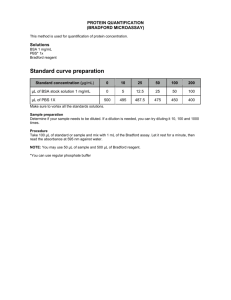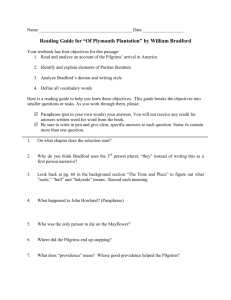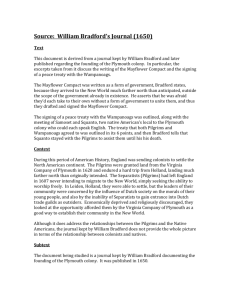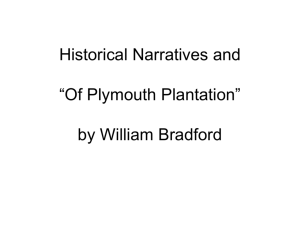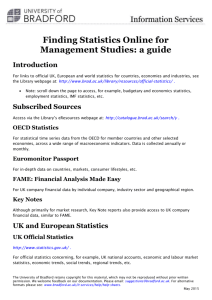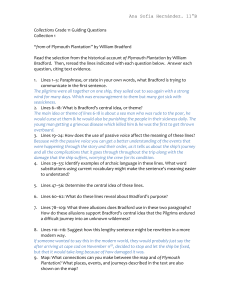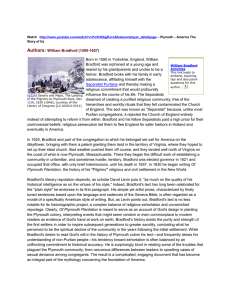Of Plymouth Plantation
advertisement
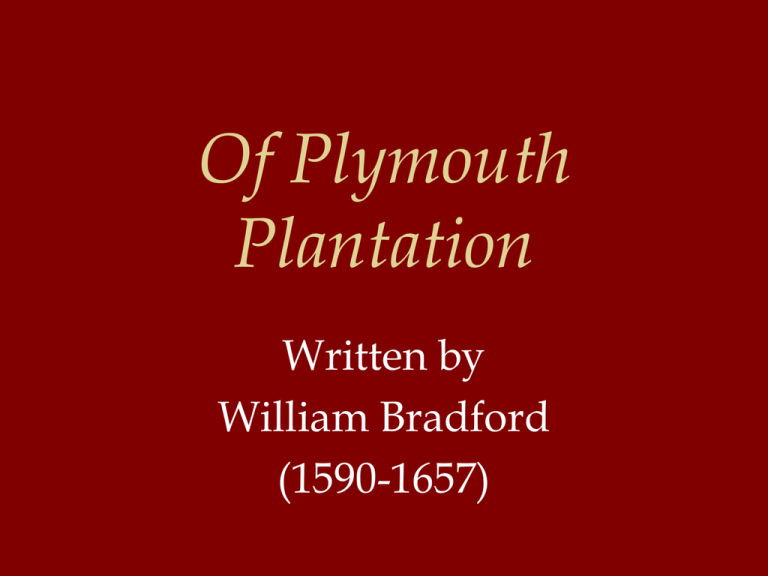
Of Plymouth Plantation Written by William Bradford (1590-1657) Bradford’s Timeline •1609: Fled to the Netherlands with the Scrooby Separatists. •1620: Sailed on the Mayflower to New England •1621-1656: Served as governor on the Mayflower to New England •1630-1651: wrote Of Plymouth Plantation Pertinent Facts about Bradford • Admired as a Christian and a writer. • Recounts the history of the Pilgrims ~The tribulations before coming to the New World • Son of an English (British) farmer • Orphaned at 16 • Became a member of Scrooby Separatists • 1609-Maker of linen & cotton (non prosperous) • Great supporter of the migration to the New World. Pertinent Facts about Bradford Continued… • He & his wife, Dorothy, arrived in 1620 on the Mayflower (they left their young son behind). • She drowned before they settled at Cape Cod. • Some people think that she committed suicide. • He remarried & had three children. • Good administrator • Negotiated fairly, but firmly with the Indians ~Example: When an Indian tribe tried to scare them by sending by sending them a bunch of arrows wrapped in a snakeskin, Bradford ordered that the snakeskin be sent back with bullets in it. Pertinent Facts about Bradford Continued… • Not a professional writer • No one really knows why he felt led to write Of Plymouth Plantation in 1630. • Possible reasons why: – He may have wanted to make sure that the Pilgrims weren’t overlooked by history. – Once the colony was established he may have had more time on his hands for leisurely writing. In Class Reading from Chapter 9 • Most famous chapter of this history • Contains a celebrated contrast between two young men. ~Ungodly sailor & Godly saint ~One who dies an untimely death & others who experience a miraculous rescue. • Paragraph 2 ~Uses 3rd Person -Method of storytelling in which a narrator relates all action in 3rd person pronouns such as “he” or “she.” Chapter 9 Continued… • He was present with them, yet speaks of them (Pilgrims) in 3rd person • Why does he do this? ~Smith did this also. • Maybe out of modesty or to seem more trustworthy to his readers • Biblical Allusions ~God’s providence • Classical Allusions ~Roman Stoic philosopher, Seneca • Other imaginative comparisons: ~Plight of the Pilgrims/Paul’s shipwrecked company. Chapter 9 Continued… • Pilgrim’s Plight ~Hostile Indians ~Hostile Weather ~Hostile Environment ~Separated from home by ocean ~No ship to retreat to ~Netherland Brethren couldn’t help them. ~They could only look to God for help. • Final Paragraph ~Filled with scriptural quotations ~Moving testimony to Bradford’s & the Pilgrims’ faith -The Bible has an uncanny way of soothing the distressed soul. In Class Reading from Chapter 11 • Foundation of government for Plymouth • Some Mayflower passengers didn’t plan on honoring their previous commitments ~Remember that ½ of them were not Pilgrims, but strangers (Bradford’s term) • The rest of the chapter: ~Disastrous first winter (over ½ died) ~Surprising discovery of English speaking Indians in New England. ~Squanto – “sent by God” -Corn planting • Peace until Pequot War in New England In Class Reading from Chapter 12 • Records what has been called the ‘first Thanksgiving’ • Edward Winslow’s letter of December 11 , 1621 is more complete view • Bradford tells us what New England life was like. • Later writers both affirm and contradict Bradford’s thoughts on New England.


